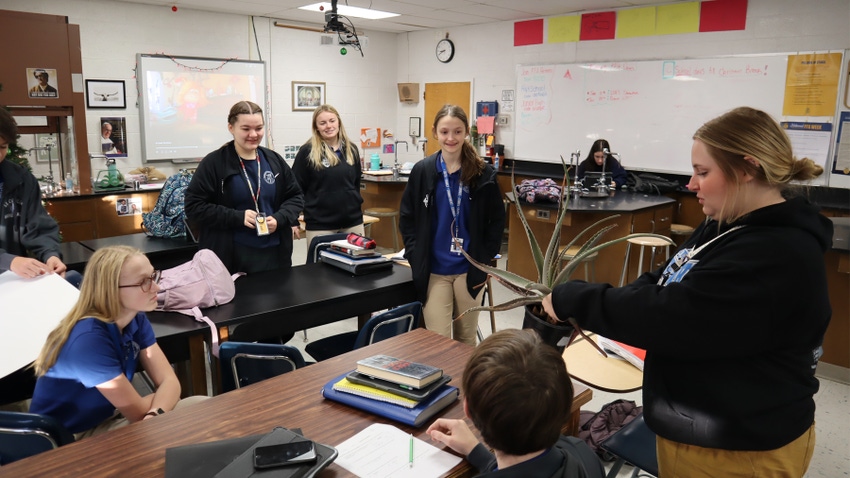February 24, 2023

by Holly Wortmann
The connection a teacher has with a student reaches far beyond the classroom. A teacher dedicating their career to teaching agricultural education exposes youth to the opportunities that exist in a growing agriculture industry.
Shelby Studnicka is in her second year of teaching agricultural education at St. Cecilia in Hastings, Neb. She shaped the school’s first FFA chapter during the 2021-22 academic year. According to Studnicka, the interest and decision to become an ag teacher was sparked and ignited by her former instructor.
“I grew up in Blair and was involved in 4-H and FFA,” she says. “One day, when I was a sophomore in high school, I was staying after school with my FFA advisor, and she asked me ‘Have you ever thought about being an ag teacher?’ She planted that idea, and I thought she was onto something.”
Encouraging words
Those encouraging words from her past teacher were the influence Studnicka needed to become an agricultural educator. She says she’s been solid on her path ever since.
“I went to University of Nebraska-Lincoln and was on the livestock judging team,” she says. “My last year of college, Hastings St. Cecilia was looking to add the agricultural education program. I never really envisioned starting an FFA program, but there was so much excitement and support from the school, parents and community.”
St. Cecilia's parents and community have been instrumental in the young program’s success. In fact, the initial driving force for the agricultural education program at St. Cecilia was parent advocacy, Studnicka says.
“That was pivotal to the school making it happen,” she says. “And we’re growing in numbers. This year, we added junior high, and it's one of the best things we’ve done, because our enrollment in FFA has gone up. We’ve been really blessed to see such positive outcomes in just our first two years in existence.
“We get out in the community a lot. In October, we do a trunk-or-treat activity; December is a live nativity scene — and various concessions and food stands at the home games throughout the rest of the year.”
Customizing the program
Because there’s no one plan that fits all, especially in the agricultural classroom, Studnicka has had to find unique ways to serve her students.
“Most of my kids do not come from agricultural backgrounds,” she explains. “Right now, many of my students are finding their own passion in agriculture, and we’re doing a lot of growing. We bought five show rabbits this year, and some students have shown them at our county and state fairs.”
Studnicka jokes that she’s had to get creative with limited space. “The rabbits are right in the classroom, so we’re learning about proper feed, genetics, grooming, even cleaning the trays,” she says. “Sometimes when the rabbits get stinky and the kids start to whine, I remind them it's time to clean the cages.”
Studnicka accepts that, as a newer teacher, she looks for help along the way, especially because she’s building her curriculum. “I have mentors I go to that are so devoted to kids, and I value their opinion,” she says. “I also have other ag teachers in my district that have taught so long and are great resources.”
Just as her former teacher was encouraging, Studnicka offers advice for the exploration of agricultural education as a career choice.
“I would tell a student who is considering ag ed as a career that it is a really rewarding path that fosters a family-type atmosphere,” she says. “The bonds that I see the program encouraging among our students and chapter members is exciting. And the support and genuine care that come from other ag teachers really make ag ed a professionally and personally fulfilling career.”
Rewarding career
“As with any profession, some days aren’t easy. Like coming home from a full day at an FFA event, getting a flat tire and having to call my new husband for help,” Studnicka says with a laugh. “But other times, at a parent-teacher conference, when a parent tells me that their kid found their home and place to belong and excel, I know I’ve done what I set out to accomplish. It is a rewarding career.”
To start an agricultural education program or FFA chapter in your school, visit education.ne.gov.
Wortmann writes from Crofton, Neb.
You May Also Like




